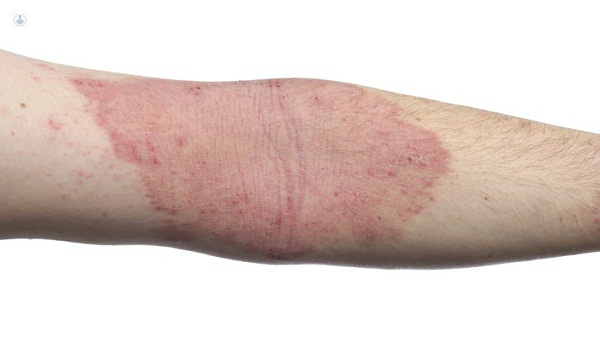Causes, treatments and common triggers of eczema in children
Written by:Sometimes referred to as atopic eczema, childhood eczema belongs to a group of conditions that, in addition to eczema, include asthma, hay fever and certain food allergies. Those affected will often have all or some of these problems.
In this article, renowned consultant dermatologists, Professor Andrew Wright, explains more about the development of eczema in young children, how it can be effectively treated and what common triggers you should look out for.

Where does eczema typically first develop?
This type of eczema initially appears in the first six to eight weeks of life. It often develops in what is described as a flexion pattern, that is, around the wrists, the insides of the crook of the elbows, behind the knees and around the neck. If the eczema is poorly controlled, it may steadily become much more generalised and chronic.
As there is a genetic predisposition to the condition, it is often recognised at an early stage as other family members are also affected. However, help at this stage with input and expert advice is essential in controlling the condition and helping to prevent its progression.
How can eczema be treated?
Atopic eczema is a multifactorial condition, and most patients benefit from the attention and support of experienced healthcare professionals. Generally, the skin is dry and regular application of a moisturiser to improve dryness will hopefully reduce the need for topical steroid medications. However, most eczema requires short bursts of topical steroids to bring it under control. Supervision should usually be carried out by people experienced in the management of eczema.
Occasionally, infection can exacerbate eczema and short courses of antibiotics may be necessary.

What are some common eczema triggers?
The development of an allergy to a variety of things can play a role in the development and exacerbation of eczema.
The most common allergens are so-called aeroallergens - things that can be transmitted through the air. These include:
- house dust
- mites
- pollen
- animal fur
- moulds
Occasionally, food allergies, particularly to milk, eggs, fish, nuts and wheat can occur.
The presence of any of the above allergens can sometimes make eczema worse and more difficult to manage.
Food allergy testing should be performed by healthcare professionals experienced in this area. It is important to note that excessive dietary changes can lead to malnutrition and other problems. Therefore, dietary changes should only be made under medical supervision.
Where can patients and families get extra support?
There are several support and self-help groups for patients and families with eczema. The National Eczema Society has a good website and provides excellent general advice and guidance.
If you or your child have eczema and need specialist advice, don't hesitate to book a consultation with Professor Andrew Wright via his Top Doctors profile today.



